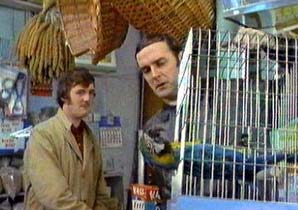
There are a lot of things I'm grateful to my father for teaching me as a child but perhaps the the greatest thing he instilled in me was an understanding that I can be wrong.
Dad valued objective logic above everything and I think he understood that the greatest obstacle to the application of objective logic was the difficulty of overcoming one's own prejudices towards a preconceived notion of what is "true." He saw deductive logic as a road with many junctions and turnoffs in which the destination (truth) had to remain unknown by definition.
He had a big problem with Ayn Rand's philosophy of Objectivism. Rand's exultation to "always check one's premise" drove him crazy. Rand was basically saying that if the application of logic doesn't bring you to the correct "truth" then you need to back up and find a path that will get you there. This inductive logic is nothing more than intellectual self-justification writ large.
I've been thinking about that a lot lately when pondering the state of politics in America. We spend a lot of time talking about the differences between red and blue America, the differences between conservatives and liberals, moonbats and wingnuts but the REAL difference that most dramatically separates Americans is the difference between those that celebrate and utilize objective reasoning and those that utilize subjective reasoning in the application of their personal politics.
Digby has an excellent post up on the media entitled Media Contortionism in which he takes the media to task once again for the false equivalency and balance which the regular media is killing itself.
The country is in the middle of several "wars" in both the literal and metaphorical sense. If it was ever called for, the time to "exercise a certain caution, a prudent restraint, in pressing a claim for a plenary indulgence to be in all places at all times the agent of the sovereign public" is long past. The public isn't crying out for "balance," particularly when those who claim to provide it have no earthly idea even how to define it. They are looking for truth. Plain, simple truth.
Perhaps it's just an error of clarification but I simply can't agree that "the public" is crying out for truth. A good portion of the public aren't looking to have their beliefs challenged but, rather, to have their beliefs reinforced or, as Ayn Rand might say: "to help them to remember their premise." They want to have THEIR truth justified, not THE truth.
Digby hopes that if we can get the media to recognize that by ceasing to play to the personal truths of a segment of the population those individuals will either come to painfully accept objective reality or to be marginalized and eventually lose political power. When considering some of the highlights of the political fights of the last few years, from the 2000 election fiasco to the Swiftboaters for Truth nonsense, I don't see those vested in outcome of those events walking away quietly and allowing themselves to be marginalized.
A loss of political power just doesn't fit into their premise. And don't even begin to try and tell them the parrot is bleedin' demised.
































5 comments:
Who is Jospeh Galt?
I read a few of Rand's books and was even taken with some of her notions for a while. Her premises only worked in novels.
Yeah Don,
I think everyone shold read Rand at some point.
But those who take her seriously as a philosopher I have to wonder about.
I am Jospeh Galt.
I really liked The Fountainhead (the only Rand I've read) and I do believe there are some really good ideas in that book. When I read it I felt there was something missing though - it seemed like a cartoon version of reality in some ways. It wasn't until I read Hero with a Thousand Faces by Joseph Campbell that I realized where Rand took a left turn into stupidtown. Rand's Toohey character is supposed to represent the evil in man, the force that holds men back and drives them to mediocraty, but Campbell (along with 5000 years of human mythology) tells us that the Tyrant doesn't appear out of nowhere - he was once the hero. Every Toohey started off as a Roark. Every one. When people use their energy to empower others they are the hero, but when they use their energy to maintain the status quo for themselves and their group, they are the Tyrant. The two are part of a cycle. Thus, when Steve Jobs creates Apple computer and helps create the PC revolution he is a hero - but when he purposely torpedoes the potential to combine cell phone and Ipod technology to protect the Ipod brand he is a Tyrant. Same guy.
I can see real life versions of the Roark character (although not as perfect and idealised as he is), but there are no real life versions of the Toohey character. The idea that anyone has the philosophy (even subconsiously) that holding everyone back so that everyone is equal is ridiculous. The only people with enough power to hold back potential heroes are the Tyrants, and the only reason they want to hold everyone back is to mantain their own personal advantage. Rand wants to seperate the two into their own little petri dishes and never the twain shall meet, the only way for her to do this was to create a unbelievable person that could never exist in real life - a Tyrant that was never a Hero. No such thing. There never was, never will be a Toohey in this world. So fuck you Rand, you're overhyped.
Seph,
Comparing Campbell and Rand is interesting and I think pretty insightful.
The only people with enough power to hold back potential heroes are the Tyrants, and the only reason they want to hold everyone back is to mantain their own personal advantage.
This, along with your observation about the dual nature of heroism and tyranny, is dead-on.
(You might enjoy this article comparing "Atlas Shrugged" favorably to the "Lord of the Rings" http://www.pierssen.com/cfile/objectivist.htm)
There never was, never will be a Toohey in this world.
To this I think Rand would disagree. SHE is Toohey to her way of thinking. So much of her work is simple rationalizing. Rationalizing greed. Rationalizing selfishness. Working to convince herself and her readers that success was simply a matter of imagination and creativity. Hello-- Brittany Spears.
When I read Objectivist writings today I can't help but think "political sociopath." Rand's followers took their first step towards a life of circular reasoning when they refused to approach her work critically.
Still, I can't help but wonder if Rand had lived longer if she would have retained the same views of the relationship of man and the state. What would she think of the mega-corporations and huge advertising budgets, miniscule r&d budgets and generic, leech-like CEOS? What would she think of the internet; created by the government, nurtured by collectivist groups (Universities) with capitalists only arriving late to the party? Would she have reconsidered her youthful experiences with communism in light of the failings of today's Laisez-Fairre capitalism?
Probably not.
Like the rest of the wackjobs, she would simply spin her wheels even faster to escape reality.
Post a Comment